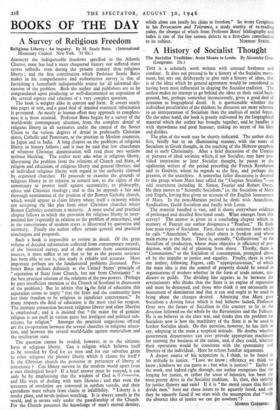- A History of Socialist Thought
The Socialist Tradition : from Moses to Lenin. By Alexander Gray. - (Longmans. 21s.) The Socialist Tradition : from Moses to Lenin. By Alexander Gray. - (Longmans. 21s.) Tins is a scholarly work written with unusual freshness and candour. It does not pretend to be a history of the Socialist move-
ment, but sets out deliberately to give only a history of ideas, that is of the ideas which by general agreement would be considered as having been most influential in shaping the Socialist tradition. The author makes no attempt to go behind the ideas to their social back- ground, but, perhaps somewhat inconsistently, gives a good deal of attention to biographical detail. It is questionable whether the individual peculiarities of the thinkers he discusses are more relevant to an interpretation of Socialism than the analysis of social forces. On the other hand, the book is greatly enlivened by the biographical material which the author has brought together, and he handles it with shrewdness and good humour, making no secret of his likes and dislikes.
The plan of the work may be shortly indicated. The author deals first, briefly but in an illuminating manner, with the roots of Socialism in Greek thought, in the teaching of ihe Hebrew prophets and in early Christianity. After a brief discussion of the Utopias or pictures of ideal societies which, if not Socialist, may have pro- vided inspiration to later .Socialist thought, he passes to the egalitarian writers of the period preceding the French Revolution and to Godwin, whom he regards as the first, and perhaps the greatest, of the anarchists. A somewhat fuller discussion is devoted to the group whom Marx later called the "Utopian Socialists "—an odd assortment including St. Simon, Fourier and Robert Owen. He then moves to "Scientific Socialism," i.e. the Socialism of Marx and Engels, having first given an account of the English forerunners of Marx. In the post:.-Marxian period he deals with Anarchism, Syndicalism, Guild Socialism and finally with Lenin.
The material handled is vast, and it shows everywhere evidence of prolonged and detailed first-hand study. What emerges from this survey? The answer is given in a concluding chapter which in memory of Fourier our author designates a " Postface." He finds four main types of Socialism. First, there is an extreme form which he calls "Anarchism," whose chief object is freedom and whose main enemy is the State. There is, secondly, " Collectivism " or the Socialism of production, whose main objective is efficiency of pro- duction, with the aid of planning from above. Thirdly, there is "Communism," or the Socialism of consumption prompted above all by the impulse to justice and equality. Finally, there is what our author, following Faguet, calls " appropriationism " of which the main idea is that the control of property should be vested in organisations of workers whether in the form of trade unions, syn- dicates or guilds. The dividing line appears to be between the revolutionary who thinks that the State is an engine of repression and must be destroyed, and those who think it not necessarily an instrument of domination and that it can and ought to be used to bring about the changes desired. Admitting that Marx gave Socialism a driving force which it had hitherto lacked, Professor Gray sees the future of Socialism in this country to lie in the direction followed on the whole by the Revisionists and the Fabians. He is no believer in the class war, and thinks that the problem for Socialists now is how the machinery of the State is to be used to further Socialist ideals. On this question, however, he has little to say, adopting in the main a sceptical attitude. He doubts whether government departments can ever provide appropriate machinery for running the business of the nation, and, if they could, whether their operations would be consistent with the spontaneity and liberties of the individual. Here he echoes familiar arguments.
A deeper source of his scepticism is, I think, to be found in his attitude to justice. "Love we know ; efficiency we think we know ; kindness we can guess at ; but what is justice? " Earlier in the work, and indeed right through, our author recognises that the longing for justice, or rather the sense of injustice, has been the most potent drive in the Socialist tradition. Is, then, this striving for justice illusory and vain? If it is "the moral issues that finally divide men," have not these issues to be squarely faced, and can they be squarely faced if we start with the assumption that "with the abstract idea of justice we can get nowhere "?
MOMS GThiSRERG.


























 Previous page
Previous page